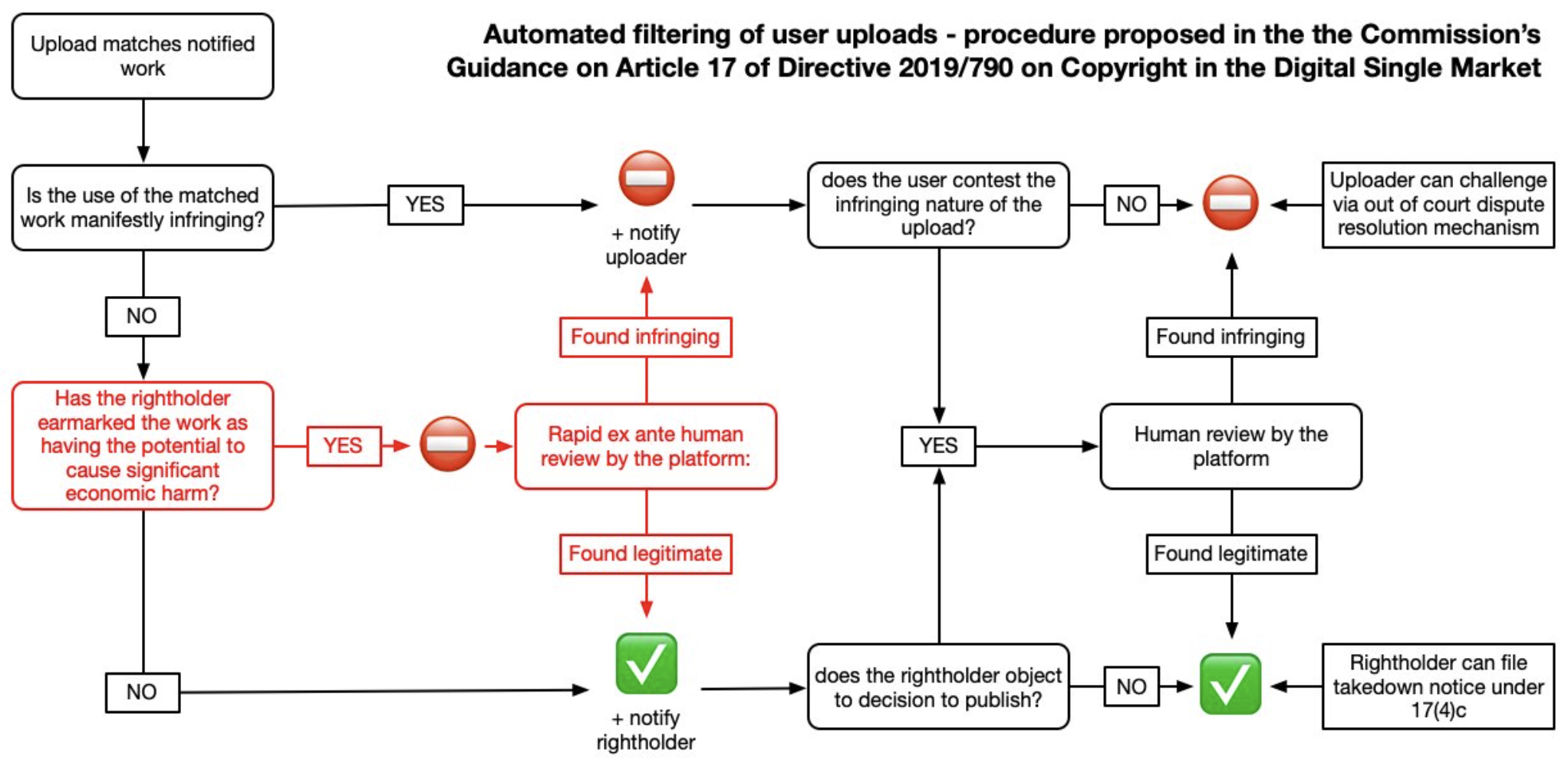På måndag skall EU:s nya upphovsättsdirektiv vara implementerat i medlemsstaternas lagstiftning. Det var i vart fall tanken, tills man insåg att direktivet ställer principer som är svåra att förena mot varandra.
Idag presenterade EU-kommissionen sitt vägledande (ej bindande) dokument om hur detta skall gå till – och då speciellt hur den kontroversiella artikel 17 (tidigare artikel 13) skall tillämpas. Det vill säga den artikel som i praktiken kommer att leda till uppladdningsfilter.
Tidigare har kommissionen menat att bara innehåll som uppenbart bryter mot upphovsrätten (manifestly infringing content) skall stoppas. Nu har detta ändrats till att allt innehåll som flaggats av upphovsrättsinnehavaren skall stoppas. Vilket i praktiken innebär att sådant material blir omöjligt att använda även i syften som borde vara tillåtna – som memes, kritik, debatt m.m.
»The first draft of the guidance document seemed to recognize those concerns and prioritize user rights. But the final result, issued today, is disappointing. On the plus side, the EU Commission stresses that Article 17 does not mandate the use of specific technology to demonstrate ”best efforts” to ensure users don’t improperly upload copyright-protected content on platforms. However, the guidance document failed to state clearly that mandated upload filters undermine the fundamental rights protection of users. The EU Commission differentiates ”manifestly” infringing uploads from other user uploads, but stresses the importance of rightsholders’ blocking instructions, and the need to ensure they do not suffer ”economic harm.” And rather than focusing on how to ensure legitimate uses such as quotations or parodies, the Commission advises that platforms must give heightened attention to ”earmarked” content. As a practical matter, that ”heightened attention” is likely to require using filters to prevent users from uploading such content.«
Diego Naranjo, Head of Policy hos EDRi säger:
»Having participated in the stakeholder dialogue, which was a lengthy and transparent process, we have the impression that the results of this process were sacrificed in the final months leading up to the launch of these guidelines, behind closed doors and due to pressure from the entertainment industry.«
»[T]o protect users’ fundamental right to freedom of expression, fully automated blocking must be limited to cases of manifestly infringing uploads. All other cases require some form of human assessment, during which the user uploads must remain available. However, by including an exception to this rule in the final guidance that is so broad as to cover virtually all cases that rightholders wish to cover, the rule that user rights are protected becomes the exception in practice.«
Nuvarande ledamoten av Europaparlamentet Patrick Breyer (PP, DE):
»Once again, the EU Commission accepts the collateral suppression of legal content in the interest of industry profits. Civil society, which has taken to the streets in Europe in their thousands against this radical automated restriction of freedom of expression, is once again being thrown out on its ear. The manual review of unjustified filtering will usually take place too late to prevent damage to our freedom of expression, especially for comments on current affairs. It is no surprise that these guidelines are published on a Friday and only three days before the transposition deadline, with major Member States having transposed the Directive already, in order to give EU citizens and activists as little chance as possible to react to this fundamental rights breach.«
På samma länk uttalar sig även Europaparlamentets vice talman, Marcel Kolaja (PP, CZ):
»What the Commission basically says is that all manifestly infringing content needs to be blocked. However, that means that all the content that is being uploaded needs to be monitored. And of course, that is not something that the platforms would be able to do manually. Therefore, service providers will be forced to use upload filters. However, these are error-prone and will not be able to correctly recognize exceptions, such as content that is a satire or a parody. Even with the Commission’s guidance, upload filters will not be able to correctly distinguish infringing content from manifestly infringing content. Freedom of expression will become unjustifiably restricted.«
Notera speciellt att dagens vägledande dokument från EU-kommissionen alltså skiljer sig från den första versionen – som kommissionen lämnade in till EU-domstolen med anledning av att Polen överklagat artikel 17.
EU-domstolens generaladvokat genomskådade dock bluffen och sköt upp sin rekommendation till dom från maj till senare i sommar – i väntan på kommissionens slutliga dokument. Vilket uppenbarligen var klokt, med tanke på hur det har förändrats.
Nu hänger frågan om uppladdningsfilter i upphovsrättsdirektivet och »fair use« alltså på EU-domstolen. Och den kan knappast ha undgått att notera att EU-kommissionen försökt föra den bakom ljuset.
